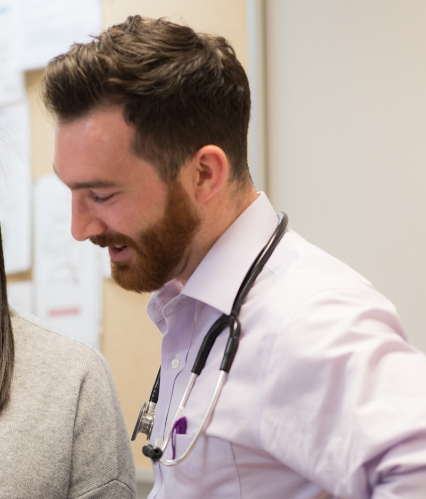Each month, we spotlight the work of a member of The Rootwise Hub community. Below we share reflections from Dr. Aaron Shapiro on their leadership practice. We honor the courage, service, and resilience that Aaron and their colleagues in the Bronx, NY have shown the world during the COVID-19 pandemic. Read on, be inspired!
Tell us a bit about yourself and your current work for social change.
My name is Aaron. I use he and they pronouns. I am currently completing the final year of my Primary Care Social Internal Medicine residency in the Bronx, NY.
My work for social change largely focuses on providing quality health care to people historically and currently marginalized by and abused by our systemically capitalist, classist, and racist health care system. I got a Master’s in Public Health in Leadership and Management focused on Quality Improvement and later my Evidence-based Design Accreditation and Certification. I am interested in being able to create structures that can provide quality, kind, and welcoming care to patients who are too often not provided safe and humane health care. My clinical work focuses on providing primary care for people struggling with substance use disorders, people struggling with chronic pain, sex workers, people of transgender experience, and people in and out of incarcerated settings.
In six words, how would you describe your experience as a leader in the past 18 months.
Upstream, isolating, collaborative, inspiring, gratifying, relieving.
In your life and work so far, what has been your most transformative leadership lesson? How did you learn it?
Most of my life I reluctantly identified as an anxious micro-manager. After a failed speaking engagement and observing multiple amazingly empowering leaders, I’ve become much more intentional about instilling ownership and trusting autonomy in the people I work with. While I’ll likely never be able to fully unlearn my anxiety, I’ve been so much happier and also a much more effective (and tolerable) leader through this frameshift. I’ve been inspired by focusing less on me egocentrically teaching and steering, but instead focusing more on facilitating others’ ideas and engagement. And there are few things I find more fulfilling than colleagues owning certain aspects of projects, moving those components forward independently, and seeing strong roots for sustainability take shape in my absence.
What is your current commitment or sense of purpose in your leadership practice?
I’ve really been working on grounding my leadership practice in humble kindness. Especially working in a “hot-spot” hospital through the height of COVID, the concept of, “be kind because you don’t know what someone else is going through,” has been such an unforgivingly salient mantra for me. I’ve done – and continue to do – a lot of work to minimize the ego in my leadership. I’m working on honing a leadership practice that creates safe spaces for people to voice their ideas for improvement and turning those spaces into ones of excited inspiration where we can workshop those ideas into action.
What advice do you have for others about how and when to use their voice to make change?
I feel it’s important to constantly use our voices to catalyze necessary change. But I think it’s important to remember that using our voices doesn’t mean shouting at full volume at all times. My voice is often used simply as a tool of active listening. It’s used to object in the moment when a superior says something offensive. I also try to be intentional about using my voice to amplify others’ as well as actively silence my voice to create space for others to be heard. I’ve found that as a white man, that last iteration of my voice has more often than not been the most important iteration.
How do you take care of yourself?
My first retreat with Perry and her colleagues was over a decade ago. I have gone to “refresher” workshops, and I’ve been meeting with a spiritual director/coach trained by Still Harbor regularly for about four years now. I depend a lot on my community and chosen family for support and fun. I try my hardest to prioritize physical activity and getting out into nature. I’ve gotten slowly better at identifying things I cannot change and being at peace with that. I am intentional about working in places that I respect and whose mission I trust to drive me forward.
What are you working to imagine, create, and build through your leadership?
One of the reasons I love Quality Improvement Sciences so much is because the discipline essentially says, “We know what to do, but are we doing it? Are we doing it well? And if not, how do we do better?” And the answers to that last question are more often than not known by the people already working on those issues. We simply inherit a culture of expectations that become obstacles to actuating our work in ways we know can be done better. Maybe we feel we’re stepping on someone else’s toes. Maybe we feel like our supervisor isn’t open to suggestions. Maybe we’re already too overworked and underpaid to have the energy to take anything else on. My leadership practice is about identifying and minimizing those barriers to people living and working with fulfillment and purpose. I want to support people around me in feeling like they’re able to do everything they can to make the world a better place. Seeing so many others light up with excitement and purpose is personally inspiring to me.
We know that you have bunny friend, can you tell us about them?
WHAT IS THE WORD LIMIT!?!?!? My bunny friend is Pinecone. He’s a one-year-old Holland Lop. He is literally the fluffiest living creature to ever live on Earth. I got him during COVID times, and he has been a lifesaver for me. He loves snuggles, fresh hay, and big carpets to zoom on. Yes his picture is the background of my phone, and yes I threw a super extra bunny themed first birthday party for him.

